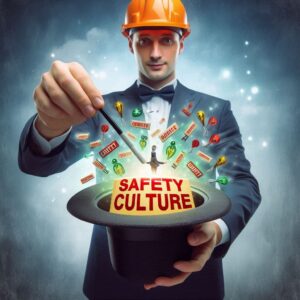
The first step in learning anything about culture is NOT to pay any attention to what Safety says about it. When Safety speaks about culture, its most often about systems. Systems and structure are NOT culture.
Yet, whenever Safety speaks the word ‘culture’, in come the suckers giving value to the source that knows nothing about culture. Moreso, these sources are often framed in safety language about ‘thought leadership’, heroics, super heroes and one I saw recently was described as a ‘change architect’, all with no expertise in culture. Some were keynote speakers at safety conferences that any anthropologist would laugh at. One engineer even described his work as a ‘culture lab’ to change a ‘heartwave’. There was more word salad associated with nothing to do with culture but you wouldn’t want to give any of its credence. All of it was prescriptive nonsense! I saw a classic recently was an engineer standing in a t-shirt stating ‘don’t talk about safety culture!’
Yet, it seems that when Safety wants to know about culture it asks an engineer! It would never work the other way around. No engineer in their right mind would ask a cultural expert about how to do engineering. What a strange industry this safety industry.
The first question anyone in safety should ask when the word ‘culture’ is used is: Is this source qualified in culture? This is when the attention given to the source should end. What follows most often is an embarrassing ignorance about culture. Sadly, the Dunning-Kruger effect is alive and well in safety culture. Indeed, it is a cultural characteristic.
The same applies when I see safety speak the word ‘ethics’. What follows is the most astounding ignorance about Ethics. Again, the source has no expertise in Ethics. We see this in the AIHS nonsense chapter on non-ethics. This is where we also see the adoration of the word ‘professional’ from amateurs. Keen summed the dynamic up well in his book The Cult of The Amateur .
So, where should one start in thinking about culture? Perhaps with a source in Anthropology, Religion, Cultural Theory, Semiotics, Social Psychology or a Transdisciplinary mix of these – NOT safety or engineering. None of these sources of expertise in culture would speak anything about prescriptive knowing or ‘fixing’. None of these expert sources would confuse behaviours, systems or leadership with culture.
So, the best advice in seeking sources about culture is, don’t go to safety for knowledge on culture.
Here are a few reliable sources on culture that are worth reading, for those who would like to understand culture:
- Barry, J., (1999). Art, Culture and the Semiotics of Meaning. St Martin’s Press. New York.
- Bourdieu, P., (1997). Culture and Power. University of Chicago Press. New York.
- Eschin, S., and Gurung, A., (2009). Culture and Mental Health, Sociocultural Influences, Theory and Practice. Wiley-Blackwell. London.
- Jenks, C., (1993). Routledge. London.
- Jourdan, C., and Tuite, K., (eds.). (2006) Language, Culture and Society. London.
- Lotman, J., (2013) The Unpredictable Workings of Culture. TLU Press. Tallinn.
- Mclaren, P., (1995). Critical Pedagogy and Predatory Culture. London.
- Mulhern, F., (2000). Culture/Metaculture. London.
- Oswell, D., (2006). Culture and Society. London.
- Shore, B., (1996) Culture in Mind, Cognition, Culture, and the Problem of Meaning. Oxford University Press.
There are many other great sources for understanding culture, just none of them can be found in Safety. No wonder the only thing that changes is the bank balance once the safety culture expert leaves.



Do you have any thoughts? Please share them below